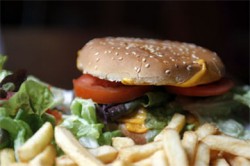 Sleep-deprived teens make poor food choices, a new study finds.
Sleep-deprived teens make poor food choices, a new study finds.
“Not only do sleepy teens, on average, eat more food that’s bad for them, they also eat less food that is good for them,” study leader Lauren Hale, an associate professor of preventive medicine at Stony Brook University School of Medicine, said in a university news release.
“While we already know that sleep duration is associated with a range of health consequences, this study speaks to some of the mechanisms, i.e., nutrition and decision-making, through which health outcomes are affected,” she explained.
The study authors examined data collected from interviews with more than 13,000 teens nationwide in 1996. The 18 percent of teens who said they slept fewer than seven hours a night were more likely to eat fast food two or more times a week and less likely to eat healthy foods such as fruits and vegetables. Well-rested teens tended to make more healthy food choices, according to the study presented recently at the annual meeting of the Associated Professional Sleep Societies in Baltimore. Research presented at medical meetings should be viewed as preliminary until published in a peer-reviewed journal.
“We are interested in the association between sleep duration and food choices in teenagers because adolescence is a critical developmental period between childhood and adulthood,” study first author Allison Kruger, a community health worker at Stony Brook University Hospital, said in the news release. “Teenagers have a fair amount of control over their food and sleep, and the habits they form in adolescence can strongly impact their habits as adults.” One of the next steps in the research is to determine whether the association between sleep duration and food choices is causal, Hale said.
“If we determine that there is a causal link between chronic short sleep duration and poor dietary choices, then we need to start thinking about how to more actively incorporate sleep hygiene education into obesity prevention and health promotion interventions,” she said.
The American Academy of Pediatrics recommends that teens get between nine and 10 hours of sleep per night.












